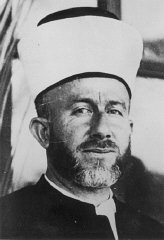You searched for: %EC%97%90%EB%B3%B4%ED%94%8C%EB%A0%88%EC%9D%B4%20evoplay%20dk22.top%20%EC%BD%94%EB%93%9C%206520%20%EC%B9%B4%EC%A7%80%EB%85%B8%EC%84%9C%EC%9A%B8%EC%A0%90%20%ED%95%9C%EA%B5%AD%EC%98%A8%EC%B9%B4%EC%82%AC%EC%9D%B4%ED%8A%B8%20%EB%B0%94%EC%B9%B4%EB%9D%BC%EC%82%AC%EC%9D%B4%ED%8A%B8%20%EC%B4%9D%ED%8C%90%20ioq
<< Previous | Displaying results 526-550 of 571 for "%EC%97%90%EB%B3%B4%ED%94%8C%EB%A0%88%EC%9D%B4%20evoplay%20dk22.top%20%EC%BD%94%EB%93%9C%206520%20%EC%B9%B4%EC%A7%80%EB%85%B8%EC%84%9C%EC%9A%B8%EC%A0%90%20%ED%95%9C%EA%B5%AD%EC%98%A8%EC%B9%B4%EC%82%AC%EC%9D%B4%ED%8A%B8%20%EB%B0%94%EC%B9%B4%EB%9D%BC%EC%82%AC%EC%9D%B4%ED%8A%B8%20%EC%B4%9D%ED%8C%90%20ioq" | Next >>
-
Leo Schneiderman describes conditions on a freight car during deportation from Lodz to Auschwitz
Oral HistoryThe Germans invaded Poland in September 1939. Leo and his family were confined to a ghetto in Lodz. Leo was forced to work as a tailor in a uniform factory. The Lodz ghetto was liquidated in 1944, and Leo was deported to Auschwitz. He was then sent to the Gross-Rosen camp system for forced labor. As the Soviet army advanced, the prisoners were transferred to the Ebensee camp in Austria. The Ebensee camp was liberated in 1945.
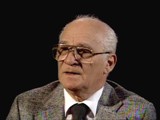
-
Thomas Buergenthal describes differing perspectives on international justice
Oral HistoryJudge Thomas Buergenthal was one of the youngest survivors of the Auschwitz and Sachsenhausen concentration camps. He immigrated to the United States at the age of 17. Judge Buergenthal devoted his life to international and human rights law. He served as chairman of the United States Holocaust Memorial Museum’s Committee on Conscience; was named the Lobingier Professor of Comparative Law and Jurisprudence at the George Washington University Law School; and served for a decade as the American judge at…
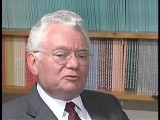
-
Concentration Camps, 1933–39
ArticleLearn about early concentration camps the Nazi regime established in Germany, and the expansion of the camp system during the Holocaust and World War II.
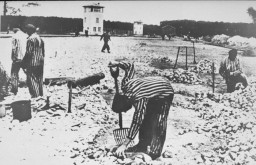
-
Vidkun Quisling
ArticleVidkun Quisling, Minister President of Norway from 1942 to 1945, was a Norwegian fascist and Nazi collaborator. His last name has come to mean “traitor” or “collaborator.”
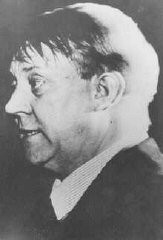
-
Darfur
ArticleFrom 2003 to 2005, an estimated 200,000 civilians died as a result of a campaign of violence in Darfur by the Sudanese government. In 2004, the US Secretary of State called this violence a genocide.
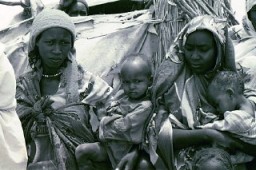
-
Nazi propaganda poster titled “The Stalin Constitution?”
ArtifactNazi propaganda poster titled “The Stalin Constitution?” printed October 10, 1943. The Nazis often used propaganda in occupied territories to secure the compliance and even support of local populations. In Ukraine and other occupied regions of the Soviet Union, the Nazis created propaganda that exploited preexisting discontent with the Soviet regime. They also tried to exploit preexisting anti-Jewish sentiment and sharpen divisions between Jews and non-Jews. One way of achieving this was by creating…
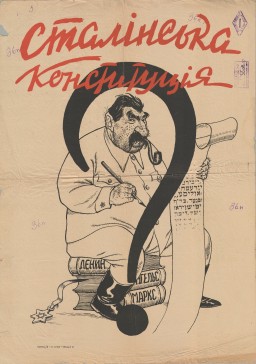
-
Genocide of European Roma (Gypsies), 1939–1945
ArticleLearn about the history of discrimination against Roma in Europe and how the Nazi regime committed genocide against European Roma during WWII.
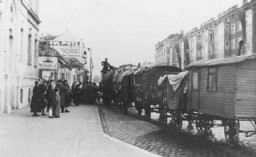
-
The Nazi Olympics Berlin 1936
ArticleThe 1936 Olympics in Berlin under Adolf Hitler's Nazi dictatorship were more than just a worldwide sporting event, they were also a show of Nazi propaganda.
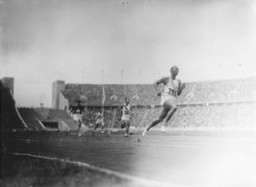
-
British Prosecutor Shawcross
FilmBritish Chief Prosecutor Sir Hartley Shawcross makes a final plea to the International Military Tribunal.
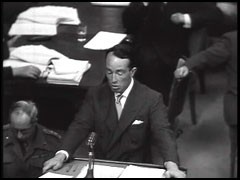
-
Barbara Ledermann Rodbell describes false papers and moving people to hiding places
Oral HistoryIn 1933 Barbara's family moved to Amsterdam, in the Netherlands. They became friends of Anne Frank and her family. The Germans invaded the Netherlands in 1940. Barbara's boyfriend, Manfred, had underground contacts and she got false papers. Her mother, sister, and father were deported to the Westerbork camp and then to Auschwitz. Barbara survived using her false papers and worked for the resistance. She helped take Jews to hiding places and also hid Jews in an apartment rented under her false name.
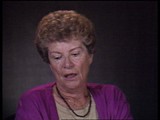
-
Henny Fletcher Aronsen describes living conditions in the Kovno ghetto
Oral HistoryHenny was born into an upper-middle-class Jewish family in Kovno, Lithuania. She and her brother attended private schools. In June 1940 the Soviets occupied Lithuania, but little seemed to change until the German invasion in June 1941. The Germans sealed off a ghetto in Kovno in August 1941. Henny and her family were forced to move into the ghetto. Henny married in the ghetto in November 1943; her dowry was a pound of sugar. She survived several roundups during which some of her friends and family were…
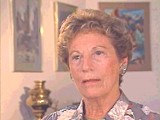
-
Fred Bachner describes flight to eastern Poland upon the German invasion of Poland in September 1939
Oral HistoryFred was born to Polish Jewish parents in Berlin, where his father owned a factory. After the Kristallnacht ("Night of Broken Glass") pogrom in November 1938, Fred's father and brother were deported to Poland. It was not until June 1939, when Poland allowed Fred and his mother to enter the country, that the family was reunited in Krakow. Fred and his family tried to flee upon the German invasion of Poland in September 1939 but were told to return to their homes. They were forced into the Krakow ghetto, and…
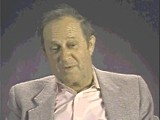
-
Bart Stern describes deportation to Auschwitz
Oral HistoryFollowing the German occupation of Hungary in March 1944, Bart was forced into a ghetto established in his home town. From May to July 1944, the Germans deported Jews from Hungary to the Auschwitz killing center in occupied Poland. Bart was deported by cattle car to Auschwitz. At Auschwitz, he was selected to perform forced labor, drilling and digging in a coal mine. As Soviet forces advanced toward the Auschwitz camp in January 1945, the Germans forced most of the prisoners on a death march out of the…
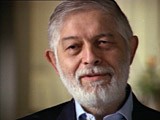
-
Wilek (William) Loew describes the hiding place in which his mother survived an Aktion in Lvov
Oral HistoryWilek was the son of Jewish parents living in the southeastern Polish town of Lvov. His family owned and operated a winery that had been in family hands since 1870. Wilek's father died of a heart attack in 1929. Wilek entered secondary school in 1939. Soon after he began school, World War II began with the German invasion of Poland. Lvov was in the part of eastern Poland annexed by the Soviet Union. Although the Soviets took over Wilek's home and the family business, Wilek was able to continue his…
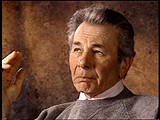
-
Israel Ipson describes forced labor to construct an airplane runway
Oral HistoryIsrael was raised in Kovno, Lithuania, and graduated from law school there in 1933. Because of anti-Jewish discrimination, he was unable to practice law. The Germans invaded the Soviet Union in June 1941, occupying Lithuania. The Kovno ghetto was established that August. By claiming to be a mechanic, Israel escaped several massacres. He was forced to work on a wooden airport runway outside the ghetto. After he escaped, Israel, his wife, and son hid in a potato pit for 9 months until liberation by Soviet…
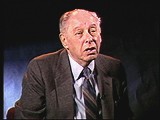
-
Ruth Webber describes the bitterness that she felt after the end of the war when she was in an orphanage in Krakow
Oral HistoryRuth was four years old when the Germans invaded Poland and occupied Ostrowiec. Her family was forced into a ghetto. Germans took over her father's photography business, although he was allowed to continue working outside the ghetto. Before the ghetto was liquidated, Ruth's parents sent her sister into hiding, and managed to get work at a labor camp outside the ghetto. Ruth also went into hiding, either in nearby woods or within the camp itself. When the camp was liquidated, Ruth's parents were split up.…
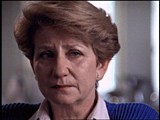
-
Ruth Webber describes the bitterness that she felt after the end of the war when she was in an orphanage in Krakow
Oral HistoryRuth was four years old when the Germans invaded Poland and occupied Ostrowiec. Her family was forced into a ghetto. Germans took over her father's photography business, although he was allowed to continue working outside the ghetto. Before the ghetto was liquidated, Ruth's parents sent her sister into hiding, and managed to get work at a labor camp outside the ghetto. Ruth also went into hiding, either in nearby woods or within the camp itself. When the camp was liquidated, Ruth's parents were split up.…

-
Rifka Muscovitz Glatz describes living on a kibbutz and dealing with language barriers
Oral HistoryRifka was raised in a religious family in Debrecen. In the early 1940s, her family moved to Cluj (Kolozsvar) in Northern Transylvania, annexed to Hungary from Romania in 1940. In 1944, she and her family were forced to leave their house in Cluj. They were rounded up by Hungarian troops helping the Nazis and taken to a brick factory where they stayed for a month. In June 1944, Rifka was transported to the Bergen-Belsen concentration camp. Eight months later she was transported to Switzerland. She sailed to…
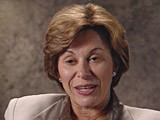
-
Frima L. describes roundup of Jews for mobile killing unit (Einsatzgruppen) massacre
Oral HistoryWhile Frima's family was confined to a ghetto, Nazis used her father as an interpreter. He later perished. By pretending not to be Jews, Frima, her mother, and sister escaped a German mobile killing unit massacre. They were later discovered and jailed. Again, her mother devised an escape. Frima's mother and sister were smuggled to Romania, while Frima wandered in search of safekeeping until her mother could arrange to smuggle her out. In Romania, they were reunited and liberated.
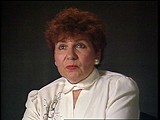
-
Ruth Webber describes witnessing a brutal punishment in the camp at Ostrowiec
Oral HistoryRuth was four years old when the Germans invaded Poland and occupied Ostrowiec. Her family was forced into a ghetto. Germans took over her father's photography business, although he was allowed to continue working outside the ghetto. Before the ghetto was liquidated, Ruth's parents sent her sister into hiding, and managed to get work at a labor camp outside the ghetto. Ruth also went into hiding, either in nearby woods or within the camp itself. When the camp was liquidated, Ruth's parents were split up.…
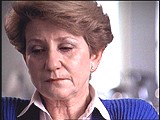
-
Ruth Meyerowitz describes sabotage effort in Malchow munitions factory
Oral HistoryIn Frankfurt, Ruth's family faced intensifying anti-Jewish measures; her father's business was taken over and Ruth's Jewish school was closed. In April 1943, Ruth and her family were deported to Auschwitz. Ruth was selected for forced labor and assigned to work on road repairs. She also worked in the "Kanada" unit, sorting possessions brought into the camp. In November 1944, Ruth was transferred to the Ravensbrueck camp system, in Germany. She was liberated in May 1945, during a death march from the…
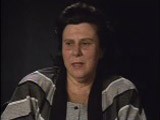
-
Combating Holocaust Denial: Origins of Holocaust Denial
ArticleLearn about some of the origins of Holocaust denial, including the euphemistic language the Nazis used to describe their policies and actions.
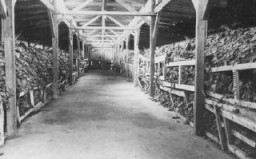
-
Nazi Book Burnings: Recurring Symbol
ArticleBook burnings and bans were not exclusive to—and did not end with—the Nazi regime. Learn more about the symbolism of book burnings.
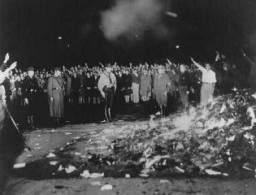
-
Wilek (William) Loew describes forced labor in Lvov
Oral HistoryWilek was the son of Jewish parents living in the southeastern Polish town of Lvov. His family owned and operated a winery that had been in family hands since 1870. Wilek's father died of a heart attack in 1929. Wilek entered secondary school in 1939. Soon after he began school, World War II began with the German invasion of Poland. Lvov was in the part of eastern Poland annexed by the Soviet Union. Although the Soviets took over Wilek's home and the family business, Wilek was able to continue his…
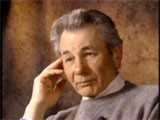
-
Hajj Amin al-Husayni: Arab Nationalist and Muslim Leader
ArticleHajj Amin al-Husayni claimed to speak for the Arab nation and the Muslim world and sought an alliance with the Axis powers during WWII. Learn more about his actions
